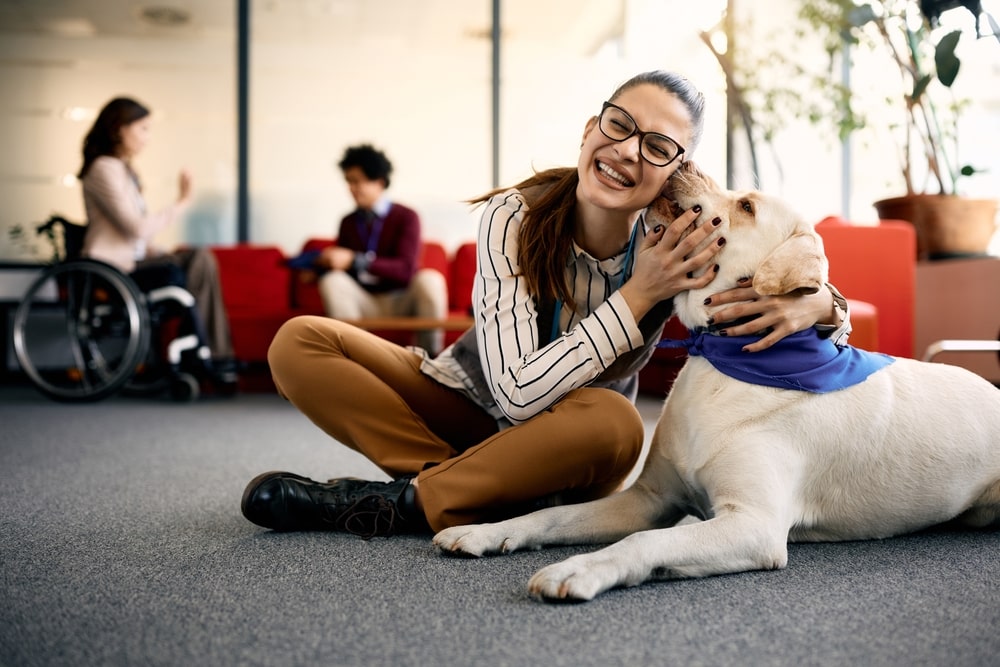Animal-assisted therapy, also known as pet therapy, uses dogs and other animals, including horses, to help people as they recover from physical and mental health conditions. A professor at Western Carolina University, Psychologist Harold Herzog, is an expert in the human-animal connection, and has spent over three decades investigating the complex psychology of human interactions with other species, and established a direct connection between interacting with animals and enjoying positive health benefits. Animal-assisted therapy is rooted in the Biophilia Hypothesis, which is the “idea that humans possess an innate tendency to seek connections with nature and other forms of life.” Animal-assisted therapy is common in many children’s hospitals as it is known to encourage adolescents to improve interactions with family and staff, take their medication more easily, calm nerves during or prior to painful or frightening procedures, etc. Pet therapy for teenagers facilitates a human-animal bond that delivers an array of scientifically documented benefits, some of which include:
- Boosts mood: Data presented by the San Francisco non-profit Pets Are Wonderful Support (PAWS) has revealed that bonding with animals prompts the body to release certain hormones (e.g., serotonin, prolactin and oxytocin) that generate a relaxation and stress-reducing response, which minimizes the symptoms of depression and sadness. Further, pet interaction can help to release endorphins, producing a calming effect and improving one’s overall psychological state.
- Improves immune system: The release of oxytocin that occurs when engaging with an animal impacts the immune system and increases the pain threshold, helping young people heal more quickly. The results of one study found an increase in salivatory immunoglobulin A, which indicates a healthy immune system function, after young people spend time petting a dog for less than 20 minutes.
- Enhances self-esteem: A literature review exploring the efficacy of animal facilitated counseling found that pet therapy “allows children an outlet for the loving part of themselves and helps them control and regulate their own behavior while developing empathy toward other living creatures. Through successes with the animal, many children can increase their self-esteem and thereby have more confidence when approaching new tasks.”
- Builds positive social skills: As stated in Human–animal interaction and the benefits to mental health: A phenomenological study, “Animal interaction can act as the vehicle through which social connection may be enhanced or increased.” One study reviewing animal-assisted therapy in psychiatric rehabilitation found that pet therapy “lead to a significant increase in interactions with other patients over the course of 4 weeks in comparison to rehabilitation without animals. This included smiles, sociability, helpfulness toward others, activation, and responsiveness.”
Animal-assisted therapy is beneficial for teenage mental health as interacting with animals strengthens and promotes teens’ emotional, cognitive, and social functioning.
For Information and Support
Every family in need of mental health treatment must select a program that will best suit the needs of their family. When one member of a family struggles, it impacts everyone in the family unit. To maximize the benefits of treatment we work closely with the entire family to ensure that everyone is receiving the support they need through these difficult times. Seeking help is never easy, but you are not alone! If you or someone you know needs mental health treatment, we strongly encourage you to reach out for help as quickly as possible. It is not uncommon for many mental health difficulties to impact a person’s life, long term. Pursuing support at the beginning of one’s journey can put the individual in the best position to learn how to manage themselves in a healthy way so they can go on to live happy and fulfilling lives.
OUR KNOWLEDGEABLE ADMISSIONS TEAM CAN BE REACHED 24/7 AT INFO@PACIFICRTC.COM OR CALL: Phone Number,800-531-5769






